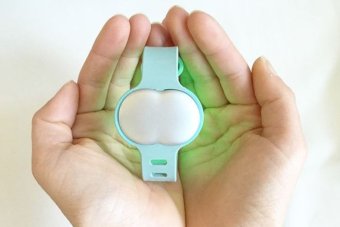How technology is transforming fertility tracking — for lads and ladies
Posted
 Photo:
When it comes to our reproductive health, many of us are clueless, says Jo Fox. (Pexels.com: Lela Johnson)
Photo:
When it comes to our reproductive health, many of us are clueless, says Jo Fox. (Pexels.com: Lela Johnson)
Since experiencing my own lengthy process to get up the duff, with many a failed attempt, I have been amazed by how little we know about our own reproduction.
Particularly women who, for so many decades of our lives, receive a monthly reminder that there is quite a lot of stuff going on under the hood.
I personally had no real understanding of the conveyor belt of my cycle and what it all meant.
It was only when I was trying to get pregnant — the exact opposite of how we normally approach the subject — that I got to grips with it.
It's not just about fertility, either; this stuff is important to women's health.
In fact, the American College of Obstetricians and Gynaecologists recently declared the menstrual cycle a woman's "fifth vital sign" — as important to her health as her blood pressure or breath.
 Photo:
Ava, a Fitbit-inspired tracking device, can identify the point in her cycle when a woman is most fertile. (Facebook: Ava)
Photo:
Ava, a Fitbit-inspired tracking device, can identify the point in her cycle when a woman is most fertile. (Facebook: Ava)
And it's not just women.
How many men of reproductive age know whether their fellas can swim, or what to do (or not to do) to improve their stroke?
This seems like a crazy thing not to know, not just because many of us are reproducing later on in life, but also because we're becoming more and more focused on health and longevity.
In our data-driven culture it is considered normal to measure calories in and out, steps walked and the length and quality of sleep we've had.
So it's good to see a couple of start-ups trying to address our lack of fertility knowledge in a consumer-friendly way.
Your new BFF: A 'Fitbit' for fertility
First, for the ladies.
Those trying to conceive naturally can now chuck away that undignified (and now one thinks about it, incredibly antiquated) urine test, thanks to the development of a new Fitbit-inspired bracelet that can identify the point in her cycle when a woman is most fertile.
The device, called Ava, is worn while you sleep and alerts you to the stage of your cycle the next day via the app.
"You have women using Uber and Spotify every day and then when it comes to fertility, it is a case of 'here's a urine stick'," the start-up's 26-year-old founder, Lea von Bidder, told The Times.
 Photo:
The Ava fertility tracking bracelet removes the need for women to 'pee on a stick'. (Facebook: Ava)
Photo:
The Ava fertility tracking bracelet removes the need for women to 'pee on a stick'. (Facebook: Ava)
"We are all about making [fertility tracking] a better, easier experience. Having it on the wrist and only worn at night will really make a difference," she added.
Rather than users having to input data, Ava tracks nine indicators of fertility — such as heart rate and heat loss — but importantly, it delivers the results in real time.
As anyone who has peed on a stick or plotted their temperature graph knows, not only is it laborious and slightly messy, it is mainly retrospective, in that it tells you when your fertile window was.
Using Ava, however, "helps you to plan and you can try more in the relevant window," Ms von Bidder said. "And plan a romantic weekend somewhere instead of rushing around."
Studies have shown the device — which is not currently available in Australia — to be almost 90 per cent accurate; it is apparently able to detect an average of 5.3 days out of the possible 6 fertile days per menstrual cycle.
Of course, the device is not just useful for women trying to get up the duff, but also for those who simply want to track their cycle and know more about their body. A useful gadget to have.
A health check-up for your sperm... via smartphone
Fellas: are you worried that the lazy, indulgent Christmas season has zapped your sperm of their zip?
As of this month you can use your phone to check the health of your potential progeny.
The Yo home sperm test is a small device that clips on to, and uses, your smartphone camera to shoot footage of live semen through a microscope.
It then links to an app that informs you not only how plentiful they are but, importantly, how many are good swimmers — less colloquially known as motility.
 Photo:
The YO Sperm testing kit clips onto smartphones and analyses sperm motility. (Facebook: YO Sperm Test)
Photo:
The YO Sperm testing kit clips onto smartphones and analyses sperm motility. (Facebook: YO Sperm Test)
Sperm motility is considered a better indicator of male fertility than simply sperm count as it describes the ability of sperm to move through the female reproductive tract.
Clearly, sperm that don't swim will not reach the egg in order to successfully fertilise it.
The Yo's American manufacturers claim it is more than 97 per cent accurate and it has been cleared to launch there later this month by the Food and Drug Administration.
The problem with male fertility
About one in 20 Australian men are infertile and more than a third (34 per cent) of men over 40 report having one or more reproductive health problems, all of them being more common among older men.
It seems quite high, really — especially given many of us are now delaying parenthood until later in life.
Not that we're great at talking about this stuff.
Men's fertility is often associated with virility, so when things don't go to plan, it can be a difficult topic to broach.
Which is all the more reason why the convenience of a kit like Yo should appeal to blokes thinking about having a baby.
It's great that new tech can make it easier — and more interesting — for both sexes to monitor their fertility.
Hopefully it also makes it more acceptable for men to investigate and talk about their fertility, and disassociate any problems they may have from their masculinity.
Jo Fox is a former ALP political adviser, including on the status of women. She is currently on maternity leave, learning how to fumble a newborn and looking at the gendered world with tired eyes.
Topics: fertility-and-infertility, men, women, reproductive-technology, womens-health, internet-technology, australia








